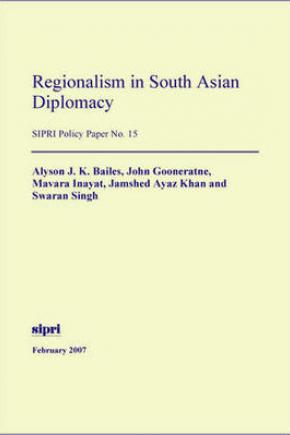Regionalism in South Asian Diplomacy

Since 2003 SIPRI has published in its Yearbook a series of guest-authored chapters on the latest developments in regional security cooperation—or the lack of it—in various parts of the world. The SIPRI Yearbook 2006 contained a chapter by the Institute's Director, Alyson Bailes, and Dr Andrew Cottey of the University of Cork that tried to set out a new, objective analytical approach for assessing both the success and the legitimacy of different regional security ventures. How well have they performed in avoiding local conflicts, promoting constructive military cooperation, improving governance in the security sector and more widely, and tackling 'new threats' like terrorism and the functional or economic aspects of security? Do they represent a fair balance of their members' interests, without necessarily damaging those of outsiders; do they adapt flexibly to changing security conditions; and do they offer good returns on the resources that are invested in them?
SIPRI Policy Paper No. 15 applies these questions to one of the world's best-known problem areas. Regional cooperation directly targeted at security issues has been a non-starter for most of South Asia's post-World War II history because of the adversarial relationship between India and Pakistan, but also because of a more general asymmetry between India and its smaller neighbours, and other persistent security problems (like the Sri Lankan internal conflict) that the region itself seems unable to master. Nevertheless, the South Asian Association for Regional Cooperation (SAARC) has managed to keep the region's states working together for more modest purposes of economic and social cooperation, and has recently adopted documents on some 'new threat' issues. Could the conditions be maturing for a more positive turn in regional security relationships, spurred by some kind of 'new start' in SAARC, or by the impetus of specific progress, for example in confidence building between India and Pakistan, or possibly by the way that local states are learning to live together in larger regional networks? This Policy Paper, starting with an introduction by Alyson Bailes, gives the opportunity to experts from India, Pakistan and Sri Lanka to offer their independent answers to these questions, and also contains a general assessment (by a Pakistani author) of SAARC and its prospects. It will soon be followed by a parallel Policy Paper on the Shanghai Cooperation Organization (SCO).
1. Regionalism and security building, Alyson J. K. Bailes
2. The South Asian Association for Regional Cooperation, Mavara Inayat
3. India and regionalism, Swaran Singh
4. Pakistan and regionalism, Jamshed Ayaz Khan
5. Sri Lanka and regionalism, John Gooneratne

